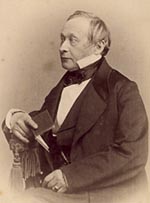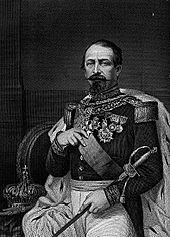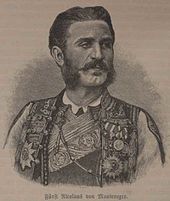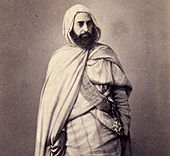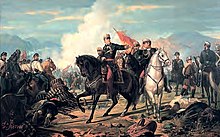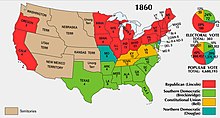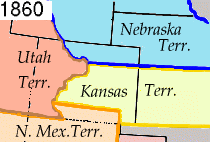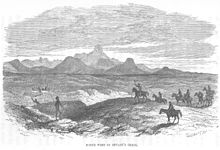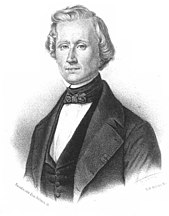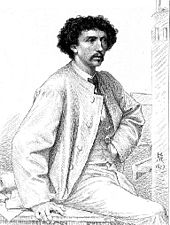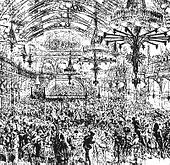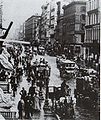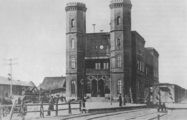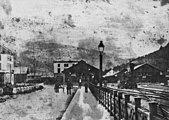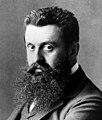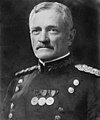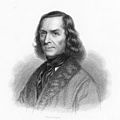1860
Portal history | Portal Biographies | Current events | Annual calendar
◄ |
18th century |
19th century
| 20th century
| ►
◄ |
1830s |
1840s |
1850s |
1860s
| 1870s
| 1880s
| 1890s
| ►
◄◄ |
◄ |
1856 |
1857 |
1858 |
1859 |
1860
| 1861
| 1862
| 1863
| 1864
| ►
|►►
Heads of State · Nekrolog · Art Year · Literature Year · Music Year · Sports Year

| 1860 | |
|---|---|
 Abraham Lincoln is elected President of the United States . Abraham Lincoln is elected President of the United States .
|
 The ballet Le Papillon by Jacques Offenbach will be premiered with Emma Livry in the title role. The ballet Le Papillon by Jacques Offenbach will be premiered with Emma Livry in the title role.
|
 Garibaldi's “red shirts” defeat Garibaldi's “red shirts” defeatthe troops of the Kingdom of Naples in the Battle of Calatafimi . |
|
|
Giuseppe Garibaldi accepted Victor Emmanuel II as King of Italy during the Risorgimento .
|
|
| 1860 in other calendars | |
| Armenian calendar | 1308/09 (turn of the year July) |
| Ethiopian calendar | 1852/53 (September 10-11) |
| Baha'i calendar | 16/17 (20/21 March) |
| Bengali solar calendar | 1265/66 (beginning of April 14th or 15th) |
| Buddhist calendar | 2403/04 (southern Buddhism); 2402/03 (alternative calculation according to Buddha's Parinirvana ) |
| Chinese calendar | 75th (76th) cycle
Year of the metal monkey庚申 ( at the beginning of the year Earth-Sheep 己未) |
| Chula Sakarat (Siam, Myanmar) / Dai calendar (Vietnam) | 1222/23 (turn of the year April) |
| Dangun era (Korea) | 4193/94 (October 2/3) |
| Iranian calendar | 1238/39 (around March 21) |
| Islamic calendar | 1276/77 (July 19/20) |
| Jewish calendar | 5620/21 (September 16/17) |
| Coptic calendar | 1576/77 (September 10-11) |
| Malayalam calendar | 1035/36 |
| Rumi Calendar (Ottoman Empire) | 1275/76 (March 1) |
| Seleucid era | Babylon: 2170/71 (turn of the year April)
Syria: 2171/72 (turn of the year October) |
| Vikram Sambat (Nepalese Calendar) | 1916/17 (April) |
The year 1860 becomes the decisive year of the Italian Risorgimento . After unsuccessful attempts at unification on the Italian peninsula in previous years, the so-called “ Train of a Thousand ” embarked on May 5th under the leadership of Giuseppe Garibaldi in Quarto near Genoa for Sicily . Garibaldi's troops, known as “red shirts”, defeat the troops of the Kingdom of Naples in several battles, advancing further and further north. On October 26th, Garibaldi finally met Victor Emanuel II , the King of Sardinia-Piedmont near Naples , after he had already annexed large parts of the previous Papal State. At this meeting Garibaldi renounces power in the new state of Italy in favor of Viktor Emanuel .
The opposite trend is emerging in the United States . In the presidential election , after the split in the Democratic Party , Abraham Lincoln is the first Republican to be elected president. Although Lincoln has always campaigned that the decision on slavery is a matter for the individual states, he is perceived as a staunch opponent of slavery and is therefore not acceptable as President of the United States to the slave-holding southern states . On December 20, South Carolina became the first state to leave the Union. The following year, then breaking American Civil War from.
Civil wars or civil war-like hostilities are also taking place in several Latin American countries. However, while they are already drawing to a close in Mexico and Ecuador , they are only just beginning to break out in other countries such as Venezuela or Colombia.
The Chinese Empire subject in the Second Opium War the European powers after four years and will have the Beijing Convention ratify an unequal treaty in which the victors many discounts are granted. After the capture of Beijing, numerous Chinese cultural assets are destroyed by the Europeans. The Spanish-Moroccan war over the Spanish possessions in northern Africa continues and ends with a decisive victory for the Spanish. And in Australia there is a race between the expedition of Burke and Wills and John McDouall Stuart in an attempt to cross the continent from south to north.
Events
Politics and world events
Risorgimento in Italy
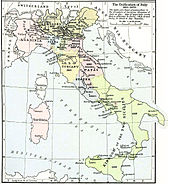
At the beginning of 1860 Italy is still in a state of political fragmentation. In the south of the peninsula is the Kingdom of the Two Sicilies , which has consisted of the island of Sicily and the former Kingdom of Naples since 1816 and is ruled by Francis II , a descendant of a side line of the House of Bourbon . To the north of this is the Papal State under the rule of Pope Pius IX. who sharply criticized the Italian agreement in an encyclical last year. The north of Italy consists of several duchies, most of which are still in Habsburg hands despite the defeat of the Austrians in the Sardinian War . Only the Lombardy could after the Peace of Zurich for the Kingdom of Sardinia -Piemont be won.
At the instigation of the Prime Minister of Sardinia, Count Camillo Benso be in March referendums in the Grand Duchy of Tuscany , the Duchy of Modena , the Duchy of Parma , in Piacenza , Bologna and other areas of Emilia-Romagna on connecting to the Kingdom of Sardinia held all of which - probably also because only certain sections of the population are allowed to vote - go out in favor of joining the House of Savoy under Victor Emmanuel II . The French Emperor Napoleon III. acknowledges the results for which he has received from Sardinia in the Treaty of Turin Savoy and the county of Nice .
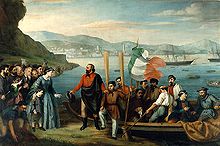
Angered by this approach, the sale of his hometown Nice to France and Cavour's hesitant, pragmatic approach, the republican Giuseppe Garibaldi decided to take the Italian unification into his own hands. On May 5th - secretly supported by Sardinia and Great Britain - under his leadership in Quarto al Mare near Genoa, the so-called " Train of Thousands ", also known as "Red Shirts" because of their uniforms , embarked for Sicily with the aim of To fight for the unity of Italy. The Genoese district will later be renamed Quarto dei Mille in honor of this event . With the two merchant ships Lombardo and Piemonte , chartered by the Sardinian government , they first go to Talamone and Porto Santo Stefano in Tuscany , where they receive provisions, weapons and coal and in this way avoid the Neapolitan fleet. On May 11, the red shirts landed under the protection of two British warships near the western Sicilian city of Marsala to reach Palermo on their way through the interior. Already in the first days Garibaldi's troops received numerous Sicilian insurgents who had been fighting the rule of Francis II and the Bourbons in the kingdom since April.
Garibaldi's units encounter the Bourbon army earlier than hoped. At Calatafimi Segesta , a town near the western Sicilian provincial capital Trapani , they are discovered by reconnaissance units and put to battle by General Landi on May 15th. In the Battle of Calatafimi , the “red shirts” are on the verge of defeat, and Garibaldi's general Nino Bixio is already proposing to withdraw, which Garibaldi does with the famous words No, Nino, qui si fa l'Italia o si muore. ( No, Nino, here we make Italy or we die here. ) Refuses. Garibaldi's victory is due in large part to the fact that Landi underestimates both the determination of the "red shirts" and Garibaldi's strategic abilities, who can fall back on years of experience in various South American wars of freedom.
Garibaldi's fighters are too exhausted after the victory to pursue the fleeing enemy, but the way to Palermo is clear. After minor skirmishes, Garibaldi moves into the city in early June, where an uprising against the Bourbons broke out at the end of May. On the way he received further influx of insurgents as well as adventurers from other countries. Among others, the photographer Gustave Le Gray and the writer Alexandre Dumas the Elder take part in Garibaldi's procession on Palermo. Shortly after Garibaldi's invasion of Palermo, on June 7th the daily newspaper Giornale officiale di Sicilia , today one of the oldest daily newspapers in Italy, appears for the first time . On July 20, there was a final battle at Milazzo near Messina . With his victory Garibaldi can get Sicily completely under his control, where on July 22nd he gives his companion Giuseppe Sirtori dictatorial power.
Exactly one month later, on August 20th, the "train of a thousand", which has now grown tenfold, crosses over to the Italian mainland. The royal troops put up only half-hearted resistance to his advance north. On September 7th, Giuseppe Garibaldi entered Naples to the cheers of the population . King Francis II retreats to the fortress of Gaeta , where he prepares for a decisive battle.
In Turin, developments in the south of the peninsula are viewed with mixed feelings, because Garibaldi's successes endanger the leading role of Sardinia-Piedmont in the Italian unification process. King Victor Emmanuel II finally decides to take action himself and sends the Piedmontese army south to "assist" Garibaldi. After Prime Minister Cavour met Napoleon III. has reassured that France will not intervene in an attack on the Papal States unless Rome itself is attacked, the army marches under General Enrico Cialdini in the Marche and Umbria .
On September 18, the Piedmontese army won the battle of Castelfidardo decisive over the papal troops under the command of the French general Louis Juchault de Lamoricière . The victory paves the way for the union of the Kingdom of Sardinia-Piedmont with the Kingdom of Naples. In Ancona , the last troops de Lamoricières emerge on September 29, the Piedmontese forces, resulting in the annexation of large parts of the Papal States entails. Pope Pius IX Only the old core area of Latium of the Patrimonium Petri remains as a property.
After a battle near Capua on September 19, in which Garibaldi's General Wilhelm Rüstow remained victorious, on October 1, around 24,000 red shirts met an army of the Kingdom of Naples almost twice as large near the Volturno River . With the defeat in the decisive battle of the Volturno , the fate of Francis II as King of the Two Sicilies is finally sealed. He was able to stay for a few more months in the fortress of Gaeta, but in February 1861 he signed the surrender and went into exile in Rome.
On October 21st, a plebiscite was held in the Kingdom of the Two Sicilies , in which an overwhelming majority voted for annexation to the Kingdom of Sardinia-Piedmont. Giuseppe Garibaldi thereupon resigns from his claim to power and the desire to found a republic . On October 26th, Giuseppe Garibaldi and Victor Emmanuel II met in Teano near Naples , in which Garibaldi addressed Victor Emmanuel as King of Italy .
Switzerland / France
Between Switzerland and Emperor Napoleon III. of France it comes to so-called Savoyerhandel : Earlier this year, leads the Swiss envoy in Paris, Johann Konrad Kern , talking with the aim of annexation of Haute Savoie to Switzerland. The French Foreign Minister informed him that in the event of the still very dubious annexation, which would have to be preceded by a vote by the Savoyards , the Emperor would take pleasure in leaving Chablais and Faucigny as her own territory out of sympathy for Switzerland.
Jakob Stämpfli , an influential member of the Federal Council and chairman of the Swiss military department , distrusts this declaration, insists on written guarantees and at the same time sparked a campaign that campaigned for the military occupation and annexation of Haute-Savoie. On the radical wing of the liberals he found great echo, with voices being voiced to give up Swiss neutrality as a “relic of the restoration ”, but the willingness of the population to let it come down to a war is much less than in the previous Neuchâtel trade the years 1856 and 1857 , when a general popular movement took place to militarily counter the Prussian threat of intervention.
Friedrich Frey-Herosé , elected as a representative of the liberal-radical parliamentary group to the Federal Council and since January 1st for the second time since 1854 Federal President of Switzerland, nevertheless came under political pressure in the course of the year due to his conviction, initially only expressed in confidential talks, Switzerland should not interfere in the question of the cession of Savoy to France, even if a territorial claim is legally justifiable. In December, Frey-Herosé only barely managed to be re-elected.
On March 24, King Victor Emmanuel II of Sardinia-Piedmont ceded Savoy and the county of Nice to France in the Treaty of Turin . Stämpfli then asked the Federal Assembly to give the government power to forestall the French occupation by invading Haute-Savoie. The assembly decides against it and votes in favor of the proposal of the moderate-liberal politicians Alfred Escher and Jakob Dubs , rapporteurs of the commission set up to clarify the legal questions. This motion declares that diplomatic resources are not exhausted and obliges the government to continue negotiations. As the crisis progressed , an incident occurred on March 30th when 150 militants, Genevans and Savoyards, hijack a steamboat and land it in Evian . You will be escorted back immediately by the regular Swiss military.
Napoleon III organizes the announced plebiscite on April 22nd , at which the Haute-Savoie promises a free trade zone with Switzerland. In view of this prospect and the fait accompli anyway, the majority of those eligible to vote (men of age) vote in favor of joining France . The annexed areas are combined to form the Haute-Savoie department , which still exists today within these boundaries.
In the Swiss parliamentary elections in 1860 on October 28, there are 120 seats in the National Council . A majority vote is used for voting. The previously dominant liberals (or radical liberals) only achieve a narrow absolute majority of the seats, while the moderate liberals can gain significantly - a consequence of opposing positions in railway and foreign policy. In all cantons, elections to the Council of States are indirect and take place through the respective cantonal parliaments . The newly elected parliament meets for the first time in the 5th legislative period on December 3rd .
Empire of Austria
Emperor Franz Joseph I shall, on 20 October , the October Diploma as a manifesto for the Empire of Austria . The strongly federalist law contains the main features of a new constitution, with which the form of government of a constitutional monarchy is introduced. A Reichsrat with 100 members will be created, which will have an advisory role in financial and economic policy issues, but will have little significance in legislative terms. With this, Franz Joseph I turned away for the first time from the system of neo-absolutism , which was declared with the New Year's Eve patent in 1851 . Foreign and war policy, however, remains the sole decision-making authority of the emperor. The compromise between the centralist tendencies of the German-speaking population and the federalist aspirations of the other nationalities cannot, however, satisfy neither the German liberals nor the Magyars in the Reichsrat , which is why the October diploma was revised four months later with the more centralized February patent . The responsible minister of state, Agenor Gołuchowski , appears to be overwhelmed by the implementation of the law, not least because of this resistance, and is replaced on December 13 by the liberal Anton von Schmerling .
Prussia
Prussian constitutional conflict
The conflict over the constitution of 1848 begins in Prussia : Regent Wilhelm and his new war minister Albrecht Graf von Roon present a plan to reorganize the Prussian army . Instead of the previous 40,000 men, 65,000 recruits are to be drafted annually, and the number of active regiments is to be increased by 39 infantry and 10 cavalry regiments . The peace army would thus have 200,000 instead of 140,000 men. The active period of service, which is three years according to the law and which was tacitly limited to two years in the previous years, is to be increased to the old level. At the same time, the Minister of War no longer wants to base the armaments of Prussia on the Landwehr , but on a standing army , because the Landwehr has not proven itself and is no longer up to date. In the first year, an amount of nine million Reichstalers is to be made available for this reform .
The Prussian House of Representatives , dominated by the liberals around Georg von Vincke , which, as co-owner of the budget law, is also authorized to make decisions on the military budget , wants to formally limit the general conscription to two years, prevent the weakening of the Landwehr and the funds to be approved for the reform Reduce the first budget year from nine to two million thalers . Nevertheless, the House of Representatives approved nine million thalers provisionally for the first year of this reform.
Jülich Fortress
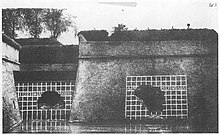
After the decision to demolish the Jülich Fortress was decided in the previous year , there was resolute resistance from the citizens of the city, who owe their livelihood to a not inconsiderable part to the maintenance of the fortifications and the orders from the garrison. The citizens submitted petitions to Regent Wilhelm, asking for the fortress or at least the garrison to be preserved. Then remains Jülich garrison town , and it will set up a Unteroffiziervorschule, in the citadel takes quarters. In September the Prussian army carried out a large siege exercise in Jülich , during which new artillery pieces and rifles and new methods of attack were tested. The citadel was damaged in the process, but it was retained, while the outer works and the city fortifications were demolished in the following years.
Further events in the German Confederation
After the death of his father Georg on September 6th, Friedrich Wilhelm (II.) , Whose name always appears without a dynastic count in the literature due to an old mistake in the Mecklenburg regent count , becomes the new Grand Duke of Mecklenburg in the Mecklenburg-Strelitz region . His reign, which lasted until 1904, is marked by a frugal economy bordering on all public spending. Necessary investments in the economy , infrastructure and education are largely omitted. Modern developments are stagnating or are only slowly making their way into the country. This policy can achieve that mountains of debts accumulated over generations can be paid off by the Princely House, but the country is developing into one of the most backward German territories.
The first constitution of the Free and Hanseatic City of Hamburg , which bears this name, comes into force on September 28th .
Russia
On 2 July, on behalf of Tsar Alexander II , Governor General Nikolai Nikolajewitsch Muravjow-Amursky founds a naval base for the Imperial Russian Navy on the Pacific coast in Eastern Siberia . This is intended to consolidate the power of the Russian Empire in the Far East after the territorial gains in the Treaty of Aigun 1858 and to strengthen Russia's position in the conflict over Asia with the other European powers. The city is named Vladivostok ( Rule the East ).
Principality of Montenegro
Danilo I , secular prince of Montenegro since 1852 , is murdered by Todor Kadić on August 13th . Since Danilo has no descendants, Nikola , son of the former Prince Bishop of Montenegro , Petar II. Petrović-Njegoš , succeeds his murdered uncle. The succession to the throne forces the nineteen-year-old to break off his Western European education at the Paris Lycee Louis le Grand , which he received as the first member of his dynasty, and to return to Montenegro. On November 8th, Nikola I. married Milena Vukotić , daughter of Vojvoden Petar Vukotić and his wife Jelena Vojvodić. Nikolaus continues the authoritarian modernization policy of his predecessor. The small town of Cetinje will be expanded into a modern capital over the next few years .
Ottoman Empire
Serbia
After the death of his father Miloš Obrenović, Mihailo Obrenović became Prince of Serbia for the second time after he had to flee the country in 1842 . During his reign he tried to detach the Principality of Serbia from the Ottoman Empire and gradually introduce an absolutist form of government.
Syria / Lebanon
A total of 20,000 Christians are killed in the civil war in the Lebanon Mountains between Christian Maronites and Muslim Druze , plus an unknown number of Muslims . 380 Christian villages and 560 churches are destroyed. The civil war culminated on July 9 in the Syrian city of Damascus in a massacre in the Christian district by incited Muslims. The Ottoman authorities do nothing to prevent the bloodshed and even provide indirect assistance to the attackers. The acts of violence, which also continued on the following day, killed a total of around 6,000 people. With the help of the former Algerian freedom fighter Abd el-Kader , who settled in Syria after his release by France, numerous Christians can be saved, for which he was led by Napoleon III. is awarded the Grand Cross of the Legion of Honor . Under pressure from France , the protecting power of the Maronites, Lebanon is subsequently separated from Syria. This takes place through the establishment of the Mutesarriflik Lebanonberg , which later became the Governorate Lebanonberg and thus the nucleus of today's Lebanon. The establishment of the governor requires the approval of the European powers, while the autonomy of Lebanon is monitored by an international commission.
Jerusalem
In the city of Jerusalem , which is traditionally divided into four quarters for Jews, Muslims, Christians and Armenians, the first Jewish quarter is being built outside the city walls due to increasing immigration .
Sub-Saharan Africa
Under President Marthinus Wessel Pretorius , the capital of the South African Republic will be relocated from Potchefstroom to Pretoria on May 1st , where almost 300 people live at that time. In the same year the republics of Lydenburg and Utrecht join the South African Republic.
At the beginning of the year, Barghasch ibn Said, with the support of his half-sister Salme , tried to overthrow his brother Majid bin Said and gain control of the Zanzibar archipelago . The attempt fails and the two are placed under house arrest, but after a short time they are taken back to court.
Spanish-Moroccan War
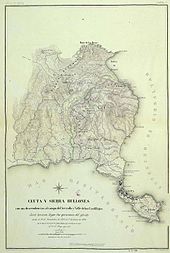
The Spanish-Moroccan war that broke out last year to expand the Spanish possessions in North Africa is entering its decisive phase: after many small but very bloody skirmishes, Spanish troops under the leadership of Prime Minister Leopoldo O'Donnell occupy the Moroccan city of Tétouan and on February 4th After a decisive defeat west of Tetouan, the Moroccans asked for a ceasefire on March 23 . In the Peace of Tetuan , which was negotiated by April 25, both warring parties agree on compensation to be paid by Morocco . The city of Tétouan becomes the Spanish bargaining chip for this. Leopoldo O'Donnell received the title Duke of Tétouan from the Spanish Queen Isabella II for his achievements in this war.
After the defeat, Sultan Sidi Muhammad IV began to attempt to modernize the Moroccan army and expand the fortifications. These measures are also directed against the troubled tribal groups of the Bedouins and Berbers , who repeatedly threaten the rural population and the cities. The population in the cities on the Atlantic coast will grow rapidly in the next few years, as the cities quickly develop into economic centers due to the greater security.
Carlos Luis de Borbón , as Carlos VI. Pretender to the throne of the Carlists in Spain, tried in April the supposed advantage of the situation to use, as the bulk of the Spanish army is tied up in Morocco, and ends with his youngest brother Ferdinand and the commander of the Balearic called Ortega in Sant Carles de la Rapita close Tortosa to usurp power. However, hardly a supporter shows up and his soldiers refuse to follow his orders. While his companion Ortega was shot dead on April 22nd after the two were arrested, Carlos was able to save his life by formally renouncing his rights to the throne in favor of Isabella, a waiver that he revoked immediately after his release on June 15th. His abdication, however, leads to a serious crisis in Carlism, because the pretender role falls to his liberal brother Juan (III) Carlos, who is critical of the Carlist ideals. And with the withdrawal, the movement subsequently has two competing pretenders.
Latin America
Central America
The civil war in Mexico between liberals and conservatives, which began in 1858 after Benito Juarez was elected president, continues unabated, but the scales are beginning to tip in favor of the president's liberal supporters. General Miguel Miramón , who was appointed counter-president by the Conservatives last year, was beaten on December 22nd near Calpulalpam by the Liberals under Jesús González Ortega and had to flee abroad. The liberal army is marching towards Mexico City , which it will reach at the end of the year. One of Juarez's fighters who stand out is Lieutenant Colonel Porfirio Díaz , who is promoted to Colonel this year.
In the January 28 concluded Treaty of Managua Britain hands over the Miskito Coast of Nicaragua . The Miskito people are given limited internal autonomy. The adventurer and former President of Nicaragua, William Walker , who was expelled from there in 1857 , tries again to seize power in the Central American state. When Great Britain refused to land on the island of Roatán and to use British Honduras as a base of operations for his campaign of conquest, he occupied the Honduran city of Trujillo in a coup on August 6th . From there he penetrates inland - pursued by both Honduran troops and British units. His mercenaries were able to hold their own in several smaller skirmishes, but Walker himself was injured in a battle near La Ceiba . At the beginning of September he surrenders to a British naval unit under Captain Nowell Salmon. From this he is extradited to the Honduran authorities, who sentenced him to death before a court martial. On September 12th, William Walker was executed by firing squad.
Presidential elections will be held in Costa Rica in April, won by José María Montealegre Fernández , who put himself to power last year. The deposed former president Juan Rafael Mora Porras , whose relative Manuel Mora Fernández was defeated as a candidate for the opposition, then tried to come to power again by means of a counter-coup from El Salvador . In September he went ashore at Puntarenas , but the expected popular uprising in his favor did not materialize. A few days later the Moranistas were beaten by Montealegres troops near La Angostura, Mora captured and shot dead on September 30th.
South America
In the context of the “national crisis” of Ecuador , the conservative politician Gabriel García Moreno allies with his former enemy, ex-President Juan José Flores , and on May 27th starts an offensive from Guaranda against the constitutional government of President Guillermo Franco Herrera . It is directed against Babahoyo and Guayaquil , where Franco's troops are concentrated. In August, Franco was defeated at Babahoyo, and on September 24, García Moreno's and Flores' troops finally took Guayaquil. Franco flees to Peru . On September 26, Moreno proclaimed a new flag for Ecuador as provisional head of state , which was again based on the colors of the former Greater Colombia .
In other Latin American states such as Venezuela ( Federal War ) and the Granada Confederation , later Colombia , civil wars began in 1860 or shortly before . In Venezuela, following the death of General Ezequiel Zamora and a defeat by government forces under their new General Juan Crisóstomo Falcón in February , the federalists change their strategy and adopt guerrilla tactics.
The Manuel Montt Torres government in Chile is responding to the numerous uprisings against the central power with a law that, in the event of a riot, makes those involved liable not only for damage to private and public property, but also for public expenditure to restore public order . In addition, another law deprives soldiers and police officers of the right to vote.
Santiago Derqui , previously Prime Minister of the Province of Cordoba , will replace Justo José de Urquiza as constitutional president of Argentina on March 5 . Urquiza is appointed commander in chief of the army and navy. He has to deal with an uprising under Bartolomé Miter , the governor of the province of Buenos Aires , which was incorporated into the Argentine federation only last year after the battle of Cepeda .
The French lawyer and adventurer Orélie Antoine de Tounens founded the Kingdom of Araucania and Patagonia on the southern tip of the American continent on November 17th together with the Mapuche people . He also created his own flag and national anthem and even had coins minted. The Chilean newspaper El Mercurio will print excerpts from his declaration of independence on December 29th . But when he tries to gain diplomatic recognition, he is ignored by the Chilean government as well as by the authorities in his home country, France.
United States of America
The United States before secession

The United States Congress sets up a committee on March 5 to investigate corruption within President James Buchanan's cabinet . The committee is chaired by Republican John Covode , an avowed opponent of Buchanan. The committee's report, due in June, casts an extremely bad light on Buchanan's government. It is copied several times and used by the Republicans as campaign material in the following presidential election, although James Buchanan will not run for the election - as announced in his inaugural address in 1857 .
The United States Census of 1860 shows a population of 31,443,321, almost 4 million of them slaves . That means a population increase of more than 35% since the last census in 1850 .

The Democratic Party is holding the Democratic National Convention in Charleston , South Carolina to elect the Democratic presidential candidate. At this convention there is a scandal and the party is split into two wings. The majority of the delegates elect the moderately slavery-critical Senator Stephen A. Douglas from Illinois as the presidential candidate; the Democrats from the southern states refuse him recognition and leave the boardroom to nominate incumbent Vice President John C. Breckinridge , a clear advocate of slavery, as an opposing candidate in Baltimore , Maryland . For the Republicans occurs Abraham Lincoln at that refers to the Republican National Convention on May 18, surprisingly against the favorite William H. Seward can prevail and for the election campaign of hit Lincoln and Liberty is composed. A fourth party is the Constitutional Union Party , a platform of former moderate Whigs who refuse to join either the Republicans or any of the Democratic wings. Your candidate is John Bell .
- The main presidential candidates in 1860
In the election on November 6 , due to the fragmentation of the Democrats, the Republican candidate Abraham Lincoln is elected President of the United States of America , although he can only win over the Northern States , a development that was already apparent before the election . The Vice President elected with him is Hannibal Hamlin . Lincoln has repeatedly stressed on the question of slavery that the decision on it is a matter for the individual states, nevertheless the slave-holding southern states have made it clear from the beginning that they will not accept a President Lincoln. In the four months between Lincoln's election and his inauguration on March 4, there is a power vacuum as the outgoing Buchanan administration does not take decisive steps to prevent secession of the southern states. In December, several members of the Buchanan's cabinet who sympathize with the Southern States step down.
On December 18, Kentucky Senator John J. Crittenden made a final attempt to use the Crittenden Compromise to prevent the southern states from seceding from the United States . The compromise aims to add six amendments to the United States Constitution . These amendments are intended to extend the Missouri Compromise , which allows slavery south of the 36 ° 30 'line, so that it would apply to the Pacific, i.e. outside the borders of the United States at the time. The compromise also forbids Congress from abolishing slavery. However, although many Southern MPs agree to the compromise, it will never be implemented. Just two days later, on December 20 , says South Carolina the first state to its withdrawal from the Union .
Western Territories
The provisional government of the Jefferson Territory , established the previous year, under Democratic Governor Robert Williamson Steele failed to obtain legal confirmation from the government or Congress in Washington during the year . Steele then tries to come to an agreement with the Kansas Territory and proposes a merger of the two territories on August 7th . But the Kansas Territory government is unwilling to negotiate with the Jefferson Territory, whose government - albeit democratically elected - it regards as illegal. In the meantime, the Pike's Peak gold rush , which began in 1858 , continues, even if more and more gold seekers leave the region around Pike's Peak in disappointment over the course of the year . One consequence of the gold rush is a referendum, according to which on November 13th the capital of the territory of Denver will be relocated to the city of Golden , which was founded only last year .
Japan
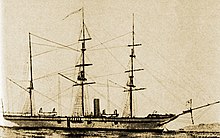
The Japanese shogun dispatches the warship Kanrin Maru on a diplomatic mission to the United States with the intention of demonstrating to the world that Japan now has Western navigation and shipbuilding technology. It leaves Uraga Street for San Francisco on January 19th . In addition to Captain Katsu Kaishū , the embassy includes Nakahama Manjirō and Fukuzawa Yukichi . On board American ships, they travel from San Francisco via Panama to Washington, DC. The official goal of the mission is to send a Japanese embassy to the United States for the first time and to sign the new Japanese-American friendship and trade treaty . The delegation also tries to revise some of the clauses of the unequal treaties signed with Matthew Calbraith Perry in 1853 , but is unsuccessful.
Ii Naosuke , daimyo of Hikone and Taïro the Tokugawa -Shōgunats in Japan , which under the Shishi numerous enemies by the so-called ansei purge has made in recent years in which he eliminate high-ranking political opponents has made, is on March 24 at Leaving Edo Castle murdered by 18 samurai. With this as Sakuradamon incident known stop the central power figure of the will shogunate killed, that does not recover from this blow again. The Edo period is drawing to a close in Bakumatsu . As a result of the attack on the Tairō, there was a wave of attacks by Tennō loyalists on officials of the shogunate across Japan. The young shogun Tokugawa Iemochi and the shogunate administration are completely surprised by the attack and try to cover up the events. Ii's death is not announced until months later. Later, Ii's assassins are pardoned during a general amnesty.
In autumn, the Prussian East Asia Expedition, led by Friedrich zu Eulenburg, lands in the Bay of Edo . This has the mandate to conclude contracts with China, Japan and Siam on behalf of all states of the German Customs Union, the Hanseatic cities and both Mecklenburgs.
Second opium war in China
After several years of war, the French and British-Indian troops gather in Hong Kong under James Hope Grant . The force consists of 11,000 British / Indians and 6,700 French and lands near Pei Tang on August 1st . On August 21st , they successfully capture the fortresses of Dagu . On September 26 the troops reached Beijing and take the city until October 6 a. The troops later devastate the Summer Palace and the Old Summer Palace . see also under culture
The Treaty of Tientsin of 1858 , after the end of the Second Opium War to the Beijing Convention expanded and in this form by Emperor Xianfeng on October 18 ratified. With this “ unequal treaty ”, Great Britain , France , Russia and the USA were given the right to open embassies in Beijing - until then a closed city . The opium trade is legalized and Christians are given the right to proselytize the Chinese people and own property.
Cambodia
The French explorer Henri Mouhot reached the city of Angkor on his second trip in January , where he wrote a travel report and made numerous drawings and sketches - especially of temples such as Angkor Wat . The later colonial power of France cultivated the myth of the "discovery of Angkor by Mouhot" in the following years.
After the death of his father Ang Duong , the 26-year-old Norodom I became king of Cambodia , which at that time was occupied by both Vietnam and Siam . However, the new ruler, who grew up in the Siamese zone, cannot be crowned for the time being because Siam refuses to surrender the regalia .
Australia
- January 21 : John McDouall Stuart and his team return from an unsuccessful attempt to cross the continent from south to north.
- On March 2nd, Stuart again leaves Chambers Creek with two other people on their way to the center of the continent.
- April 22nd : Stuart's expedition reaches what he has calculated to be the center of Australia. He names the mountain two miles away Central Mount Sturt after his mentor Charles Sturt . A few months later, the three of them return from their expedition sick and hungry.
- August 20 : Under the eyes of around 15,000 onlookers begins in Melbourne , the Burke and Wills expedition . Robert O'Hara Burke and William John Wills want to cross Australia from south to north. The expedition is the best-equipped expedition in Australian history.
- November 11th : The expedition reaches Cooper Creek and plans to stay until the beginning of March, 1861 . Burke leaves early on December 16 .
- November 29th : John McDouall Stuart starts with seven men and 30 horses from Adelaide on another attempt to cross Australia from south to north. However, due to illnesses affecting the horses, they have to wait in Chambers Creek until the end of the year before they can actually leave.
- November / December: Beginning of the Lambing Flat riots during the Gold Rush in Kiandra , New South Wales .
economy
trade
After the positive experience with the abolition of the Corn Laws ten years ago, the supporters of Manchester liberalism can post another success. Great Britain and France sign a free trade agreement with over 300 customs laws in Great Britain alone. The Cobden Treaty , drawn up by the English entrepreneur Richard Cobden and the French economist Michel Chevalier, provides in particular for the most-favored nation principle in trade between the two countries . In the following years the German Customs Union as well as Belgium, Italy and Switzerland also join the contract.
From 1860 on, coffee growing on the British island of Ceylon was replaced by tea plantations . This makes the international tea trade increasingly independent of China .
The Krupp cast steel factory founded by Friedrich Krupp in 1811 begins selling steel cannons. After the developed two years ago breech-loading cannons little appeal have found successful under the direction of Frederick's son Alfred Krupp , the sale of 312 Sechspfünder- in April muzzle to the Prussian army . Arms sales will grow rapidly over the next few years.
Patents
On October 16, Benjamin Tyler Henry receives a patent for the Henry Rifle he developed on behalf of Oliver Winchester .
Business start-ups
Two watch manufacturers are founded in the Swiss Jura this year : the watchmaker Edouard Heuer founds the Heuer watch manufacturer in Saint-Imier and Louis-Ulysse Chopard founds the Chopard watch manufacturer in Sonvilier . Both companies are still based in Switzerland today. Giovanni Panerai also founds a watch trade on the Ponte alle Grazie in Florence .
The Austrian Phönix insurance company is founded in Vienna . It quickly developed into one of the most important insurance companies in the Habsburg Monarchy , and later operated across Europe and even in the United States.
Max Kober, the 28-year-old master brewer of the Saybusch brewery , acquires parts of the property of the former Göß monastery near Leoben , where beer has been brewed since 1459 until its abandonment in 1782 , and builds a new brewery against the will of the local council . The Göss brewery quickly developed into the largest beer brewery in Upper Styria.
Gaspare Campari opened in Novara , a business in which he liqueurs sold and other drinks. That is considered to be the year the Gruppo Campari was founded .
In the north of what was then New York City, father and brothers Steinway opened a huge new factory for the production of upright pianos and grand pianos, “outside the city” (with regard to the old city limits Wall Street ) on 4th Avenue, later Lexington Avenue Block between 52nd and 53rd streets. Behind the Capitol, this factory is considered to be the largest enclosed space in the United States. The family's piano-making activities , which were previously spread across many small workshops in southern Manhattan , will be brought together in this new factory . The Corliss - steam engine to operate the saws and machines via drive shafts on the ceiling is operated in the yard in a separate building. Apart from the pianos, no wood or flammable material is tolerated: the factory of the competitor Chickering in Boston had just gone up in flames.
The Pony Express
On April 3rd, at the initiative of William Hepburn Russell , the Pony Express for mail delivery in the USA will start operations. The route runs from St. Joseph / Missouri to Sacramento / California over a distance of 3,200 km. There is an intermediate station approximately every 15 to 20 km. The postmen are on horseback. Due to its relay system, the Pony Express is very fast. Each courier is changed after a maximum of 300 km. He carries around 10 kg of express mail with him, which he has to hand over to the next rider in just two minutes. Around 75 ponies and 40 riders are needed for the entire route, and they will arrive at their destination after ten days. The Pony-Express comprises 153 intermediate stations, 80 couriers, 500 horses and 200 grooms. Since the work is not without risk, mainly young, unattached men who are not older than 18 years and weigh not more than 60 kg are employed, often orphans. William F. Cody is one of the most famous of them . Most of the ride goes through hostile Indian territory. Time and again, operations have to be stopped due to attacks. The company, which finally ceased in 1861, is a financial disaster, but it is becoming a national myth .
traffic

The Natal tank locomotive , which the Natal Railway ordered from the British company Carrett, Marshall & Co in Leeds, will arrive in Durban in May and will be assembled on site. The opening of the first railway line in southern Africa in the colony of Natal will take place on June 26th . The railway line between the city center of Durban and the landing stages at a headland called The Point is standard gauge and carries both goods and people. The route is approximately two miles (3.2 km) long.
In the United States and its territories , the length of the rail network has increased from 9,021 miles to 30,626 miles in the years since 1850. There are considerations for a first transcontinental railroad to connect the new states California and Oregon on the west coast with the east, but these fail for the time being because of the disagreement in Congress.
The Royal Bavarian State Railways will open the last two sections of the Bavarian Maximiliansbahn from Neu-Ulm to Salzburg on May 7th and August 1st . The construction of the 83.7 km long route began with the Bavarian law of May 4, 1851. Part of the route is also of the Augsburg Munich Railway Company built and opened in 1840 Munich-Augsburg Railway . It is named after King Maximilian II Joseph . Another of the railway lines completed in Germany this year is the Homburger Bahn , an 18-kilometer railway line from Frankfurt am Main to Homburg vor der Höhe , which replaces the previous horse-drawn bus line . The construction according to the plans of the well-known railway engineer Edmund Heusinger von Waldegg , which was only approved at the end of the previous year, is proceeding very quickly; the first passenger trains are already running on September 10th. Freight traffic will follow from October 6th.
On May 26, the third and last section of the will Rhein-Nahe Railway Company built Nahe Valley Railway between Oberstein and Neunkirchen at the Saar opens. Due to the difficult construction work, the railway is considered "the most expensive railway in Germany". The Bergisch-Märkische Eisenbahn-Gesellschaft will release the first section of the railway line through the Ruhr Valley from Witten BME to Bochum for passenger traffic on October 26th .


On December 1, Meißen in the Kingdom of Saxony will also receive a connection to the Leipzig-Dresden Railway from Coswig with a branch line built by the Leipzig-Dresden Railway Compagnie . Until then, carriage rides from Meißen to Dresden were the better alternative in terms of time and money. The Meissen train station as the end of the branch line is initially a terminal station , but the reception building is on the side so that the planned continuation of the route over the Elbe in the direction of Triebischtal is possible without major structural changes. In the reception building there are ticket and baggage counters, service rooms, a waiting room with a restaurant and house servant's drinking room and - due to the unheated car - a hot water bottle rental in winter. In addition to the reception building, the station will include a small wagon shed, a water station and a goods shed when it opens.

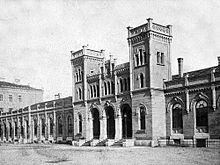
In Austria the state has withdrawn from railway construction and is again promoting private railway companies. Overall, the second private railroad phase brings with it extensive network growth. However, private individuals do not tackle economically viable projects that are risky, expensive or economically uninteresting. The two main 1860 completed railway lines are those of the Empress Elisabeth Railway built Western Railway from Vienna to Salzburg with connection to the Bavarian Maximilian's Railway, as well as from Carl Ritter von Ghega built connecting tracks Penzing Vienna Meidling and Vienna Meidling-Wien Nord train station , the biggest challenge is the connecting railway bridge, which after several unsuccessful stress tests can only be fully opened to traffic on September 2nd - after Ghega's death.

The Swiss railway line Lausanne – Bern , built by the railway company Chemin de fer Lausanne – Friborg – Berne since 1858, will be opened in two sections. The northern section from Bern to Balliswil will be opened to traffic on July 2nd, and the second section to Lausanne will also be opened on September 4th. The most elaborate engineering on the route is the steel framework construction of the Grandfey Viaduct .
In order to be able to offer direct trains from Edinburgh to London , the three railway companies North British Railway , North Eastern Railway and Great Northern Railway cooperate with each other from 1860: The three companies procure rolling stock with uniform technical specifications to ensure continuous operation on the East Coast Main Line to enable.
Suez Canal
Ferdinand de Lesseps , as representative of the Compagnie universelle du canal maritime de Suez, founded at the end of the previous year , signed a financing agreement with Muhammad Said , Khedive of Egypt , for the construction of the Suez Canal on August 6th . After the share subscription has been very slow in France and Europe in recent years, the takeover of 177,642 shares (around 44.4% of the capital) by the viceroy is formally regulated, whereby the already called 20% of the share amount essentially through Bonds and the remaining 80% are to be paid in the years 1867 to 1875.
science and technology
Africa research
After spending several years as a field clerk in French North Africa , the German adventurer Gerhard Rohlfs left the Foreign Legion . Disguised as a Muslim traveling doctor, he begins a journey through what is now Algeria in the direction of Morocco to offer Sultan Sidi Muhammad IV his support with the planned modernization measures.
Theodor von Heuglin , Austrian consulate secretary in Khartoum , who has already made a name for himself with his travel report Reisen in Nordostafrika , is appointed by August Petermann and Heinrich Barth to lead an expedition to clarify the fate of the lost Africa explorer Eduard Vogel . Other participants in this expedition are Hermann Steudner and Werner Munzinger . Alexandria is the starting point for the trip to Wadai , where Vogel disappeared in 1855.
The Briton John Hanning Speke , who believes he found the source of the Nile two years ago , is setting out from Zanzibar with James Augustus Grant on a new expedition to Lake Victoria that will last three years.
The German Karl Moritz von Beurmann is also going on a research trip to the Nile: From Egypt he follows the course of the Nile up to Korosko in Nubia . The French Guillaume Lejean and the Italians Carlo Piaggia and Orazio Antinori sail the White Nile to Gondokoro and then the Bahr al-Ghazal .
Karl Klaus von der Decken's first major expedition through East Africa leads him to Lake Malawi . His goal of opening up East Africa together with the geographer Albrecht Roscher is prevented by the illness and subsequent murder of Roscher. The Swede Karl Johan Andersson is the first European to reach the Okavango in search of the Kunene .
astronomy
The astronomer and mathematician Urbain Le Verrier , based on its calculations a few years ago already, the planet Neptune was discovered represents in a lecture in Paris on January 2, the reasoned opinion that there is a by him volcano called planets in the Mercury - Must give way. This explains the disruption of Mercury's orbit around the sun. Astronomers then begin an intensive search for the new planet, which leads to numerous false alarms and mix-ups. It was not until more than 50 years later, can Albert Einstein the apsidal precession attributed to other causes Mercury.
The mathematician and astronomer Karl Christian Bruhns becomes director of the Leipzig observatory on the Pleißenburg . Since the old observatory operated by the University of Leipzig can no longer meet its original purpose due to the dense development, he plans to start building a new observatory in Johannistal , which will be completed the following year.
List of asteroids discovered in 1860
| No. and name | Diameter (km) |
Date of discovery | Explorer |
|---|---|---|---|
| (58) Concordia | 93.4 | March 24th | Karl Theodor Robert Luther |
| (59) Elpis | 164.8 | 12th September | Jean Chacornac |
| (60) echo | 60.2 | September 14th | James Ferguson |
| (61) Danaë | 82.0 | September 9th | Hermann Mayer Salomon Goldschmidt |
| (62) Erato | 95.4 | September 14th | Otto Lesser and Wilhelm Foerster |
Biology and paleontology
Darwin's theory of evolution


The work The Origin of Species published by Charles Darwin at the end of the previous year and the theory of evolution described therein lead to serious controversy on a scientific and religious level. Darwin's theory of natural selection in particular calls Darwin's opponents and supporters onto the scene. On June 30, in the absence of the author, the Anglican Bishop Samuel Wilberforce , an avowed opponent of Darwin, and the biologist Thomas Henry Huxley , an old friend of Darwin and proponent of his theories, discussed in front of the British Association for the Advancement of Science in Oxford Darwin's work . At the bishop's side is Robert FitzRoy , who, although Darwin's cabin mate on the HMS Beagle for years, has turned into a staunch opponent of the theory of evolution by referring to the Bible . Huxley is assisted by the botanist Joseph Dalton Hooker . The fact that Huxley also expresses himself in this public debate about the Infinite Monkey Theorem is very likely to be referred to as legendary. Both sides then claim victory in the debate. In the eyes of the public, the defenders of Darwin's theory were more convincing.

Two days earlier, Huxley and his colleague Richard Owen held the hippocampus debate about the taxonomic classification of humans in the animal kingdom . Richard Owen claims that humans differ from other primates by certain morphological peculiarities in their brain structure , in particular the presence of a hippocampus minor , and that they form a subclass of their own in the mammalian class . In the discussion, Thomas Henry Huxley opposes this view and promises to refute Owen's claim. Four months later he published the work Evidence as to Man's Place in Nature .
In the same year, the German geologist and paleontologist Heinrich Georg Bronn published a translation of Darwin's work under the title On the Origin of Species in the Animal and Plant Kingdom through Natural Breeding, or Conservation of the Most Perfect Races in the Struggle for Existence , in which he however, changes and "cleansings" make.
The "primeval bird"

The imprint of a single feather of a " primeval bird " is discovered in the Solnhofen limestone in the Solnhofen community quarry . The archosaurs receives at its first description by the Frankfurter vertebrate paleontologist Hermann von Meyer a year later, the generic name Archeopteryx .
botany
The Austrian doctor and botanist Friedrich Welwitsch reported on August 16 in a letter to Sir William Jackson Hooker , director of the Royal Botanic Gardens Kew , London, about what he discovered the previous year near Cabo Negro in the Portuguese colony of Angola Welwitschie .
zoology

The German ornithologist Jean Louis Cabanis and Ferdinand Heine junior wrote numerous first descriptions of hummingbird genera , including Anthocephala and Opisthoprora .
chemistry
On the initiative of Friedrich August Kekule , Charles Adolphe Wurtz and Karl Weltzien , the Karlsruhe Congress will take place from September 3rd to 5th in the Ständehaus in Karlsruhe , the world's first international symposium for chemistry . Topics are the nomenclature of chemical compounds and their formulaic representation as well as the question of the atomic and molecular weights of chemical compounds. 127 chemists from Europe and overseas take part in the conference, including famous names such as Robert Bunsen , Adolf von Baeyer , Emil Erlenmeyer , Hermann von Fehling , Carl Remigius Fresenius , Hermann Kopp , Friedrich Konrad Beilstein , Jean-Baptiste Boussingault , Jean-Baptiste Dumas , Stanislao Cannizzaro , Dmitri Iwanowitsch Mendelejew and Lothar Meyer . Even if there are no radical results, the Karlsruhe Chemists' Congress can still be regarded as the most important event in the history of chemistry in the 19th century. The meeting of so many chemists from home and abroad has a catalytic effect on the further development of theoretical chemistry .
In Göttingen, the German chemist Albert Niemann succeeds in isolating a crystalline substance from coca leaves that came to Europe with the Novara expedition last year. He gives the alkaloid the name cocaine . On closer examination he found, among other things, that it melts at 89 ° C and, if heated further, breaks down into hydrochloric and benzoic acid as well as methanol and ecgonine .
The British entrepreneur Frederick Walton receives a patent for the production of linoxin , a mixture of substances that is created through the oxidative polymerization of linseed oil . In 1863, Walton succeeded in producing linoleum from it .
Medicine and nursing
On June 24th, the Nightingale School of Nursing , founded by Florence Nightingale with funds from the Nightingale Fund , will open in London's St Thomas' Hospital , the first non-church nursing school, with 15 trainees between the ages of 25 and 35. Basically, the training model known today as Nightingale's system provides that the training of young professionals should be carried out by experienced nurses and not by doctors. Nightingale does not consider an extensive theoretical training with subsequent exams to be very effective, since from her point of view exams are only a test of memory and say nothing about the performance of a nurse on the ward. Your training model focuses on hygiene. It also plays a role that Nightingale is a supporter of the miasm theory . In her opinion, cleanliness, proper ventilation and adequate nutrition cure most diseases. The training is not confessional, but the nursing supervisor training should place value on the character education and moral strengthening of the future nurses.
In January, the suggestion of is Edwin Chadwick written by Nightingale Nursing book What It is and What It is Not: Notes on Nursing ( Notes on Nursing: What is nursing and what nursing is not ) published, which she wrote for a group of people who have to care for the sick at home. In the same year she revised the book and published versions aimed at different groups of people. One version contains additional information for professional nurses. In the following years numerous versions and translations of the work appeared. The Nightingale system revolutionized nursing care, which was previously dominated by predominantly Catholic religious institutions, and represented an essential part of the Victorian nursing reform.
Theoretical physics
James Clerk Maxwell publishes his velocity distribution function in Philosophical Magazine (4) 19 (1860), 22 . It describes the distribution of the magnitude of the particle velocities in an ideal gas . The theory that in an ideal gas not all gas particles move at the same speed , but statistically distributed at different speeds, will be refined by Ludwig Boltzmann later. In the same year Maxwell was awarded the Rumford Medal for his research on the composition of colors and other contributions to optics .
Technical inventions
The Belgian inventor Étienne Lenoir demonstrates the first usable gas engine he invented the previous year in Paris in front of around 20 people on January 23 . The next day he received a patent for his invention, on the basis of which the Paris industrialist Marinoni initially produced a few such machines. When the Munich watchmaker Christian Reithmann found out about Lenoir's invention, he took out several patents on the four-stroke engine he had developed . He receives his first patent on October 26th .
A sound recording was made on a phonautograph constructed by Édouard-Léon Scott de Martinville three years earlier : The French folk and children's song Au clair de la lune was recorded on April 9 , 17 years before the invention of the phonograph by Thomas Alva Edison . It is the oldest surviving sound recording.
On May 28, Rev. Henry Moule applied for a patent for his Dry Earth Closet . The compost toilet , which he developed in London after the cholera epidemic in 1854 and the “ Great Stench ” of 1858 , is intended to improve hygienic conditions by reducing the smell of human excrement and at the same time making it usable for the garden.
The Florentine inventor Antonio Meucci presents a telephone device he developed . He developed it for his wife, who can no longer leave her room because of a rheumatic disease.
Shipbuilding

After more than a year and a half of construction , the Warrior , the first ocean-going iron- hulled armored ship , was launched on December 29th .
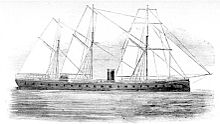
It was built by the British Royal Navy as a countermeasure to the French ironclad La Gloire , designed by Henri Dupuy de Lôme , which entered service in August. With its 4.5 inch thick forged iron belt, the HMS Warrior is practically invulnerable to the projectiles of the ship artillery in use at the time of its construction. To further improve safety against sinking, the hull is divided into 92 watertight compartments and has a double floor underneath the machinery and ammunition rooms. Due to the rapid development in marine technology, however, it is already out of date within just ten years.
When launching the HMS Warrior at the Thames Iron Works in London, it is so cold that the ship on the slipway freezes. It is the coldest winter in 50 years.
Culture
| Culture | |
|---|---|
| 3 March | The first serenade by Johannes Brahms will be performed for the first time. |
| May 7th | The comic opera Rita ou Le mari battu by Gaetano Donizetti will be premiered posthumously. |
| May | The members of the London Hogarth Club open their first joint exhibition. |
| May 16 | The Viktoriatheater in Magdeburg opens with the play Eine Nacht in Berlin . |
| 22nd of July | The Cologne Zoological Garden is founded. |
| September 24th | The Society for Salzburg Regional Studies is founded. |
| October 1 | The Grand Ducal Saxon Art School Weimar is founded. |
| 6 - October 18 | Felice Beato photographs the Old and New Summer Palaces in Beijing . |
| November 12th | The Dianabad hall in Vienna- Leopoldstadt is opened. |
| November 26th | Jacques Offenbach's ballet pantomime Le Papillon is premiered. |
| December 1 | Charles Dickens publishes the first part of the educational novel Great Expectations . |
| 13th December | The Bavarian Song by Konrad Max Kunz is performed for the first time by the Munich Citizens' Singer Guild . |
Chinese cultural goods

The war photographer Felice Beato , who recently co-operation with his colleague James Robertson has finished, photographed after taking Beijing in the Second Opium War by the British and French on 6 October to 18 October the Old and the New Summer Palace and documented so before the destruction of both buildings, their cultural treasures for posterity. In the course of the looting by the Europeans, in addition to art treasures of all kinds, those precious clocks that King George III. sent the Chinese Emperor Qianlong as a gift through the Macartney Mission in 1793 , which he interpreted as a “tribute” to a submissive people. In addition, five Pekingese dogs are captured, which until then were only reserved for the ruling house. They become the first parents of the European Pekingese .
architecture
The young and largely unknown architect Charles Garnier surprisingly wins the architectural competition for the construction of the new Paris Opera . The 15 year construction of the Opéra Garnier will be his life's work.
Visual arts
During the so-called “Silver Age of Weimar ”, Grand Duke Carl Alexander von Sachsen-Weimar-Eisenach founded the Grand Ducal Saxon Art School Weimar . This educational institution with an artistic orientation goes back to the initiative of the painter Stanislaus von Kalckreuth , who will accordingly be officially entrusted with the management of the institute at the opening ceremony on October 1st. Well-known artists of the time can be won as teachers for the new school right from the start, including Arnold Böcklin , Arthur von Ramberg , Carl Hummel , Franz von Lenbach and Johann Wilhelm Cordes . In the following years the trend in Weimar painting developed here.
The French painter Édouard Manet uses oil on canvas to paint the two pictures Portrait of the Parents and The Spanish Singer , both of which he will submit to the Salon de Paris next year and will be exhibited by it.
The Hogarth Club in London, founded in 1858 by members of the former Pre-Raphaelite Brotherhood , has its first joint exhibition in May in the new premises at 6 Waterloo Place . In the same year, however, there were disputes among the members - due to stylistic issues, but above all about the way the club should be run - which would lead to the club being dissolved as early as the following year.

Anselm Feuerbach , member of the German Artists' Association in Rome since 1857 , met Anna Risi , known as Nanna. The wife of a Roman cobbler becomes his model and his lover. This is the beginning of the series of Feuerbach's famous Nanna portraits.
Paul Cézanne receives permission from his father to paint the walls of the drawing room of the Jas de Bouffan estate, which he bought the previous year . In the course of the year, the large-format wall paintings of the four seasons are created: spring , summer , autumn and winter .
Instead of studying at the École des Beaux-Arts as requested by his parents , the 19-year-old Claude Monet entered the free painting school Académie Suisse , where he was mainly concerned with figure studies. During this time Monet attended exhibitions by painters from the Barbizon School , an artist colony founded in 1830 that promoted painting in the style of realism . He also spends a lot of time in the Brasserie des Martyrs , which is a meeting place for many modern artists and authors. His father subsequently withdrew his financial support.
The Musée des beaux-arts de Montréal ( Montreal Museum of Fine Arts ) is founded in Montreal . The museum, located in the Quartier du Musée on the Golden Square Mile , is Canada's oldest art museum. The museum, which is visited by around 500,000 people every year, is also the largest museum in the country.
The Munich painter Carl Spitzweg painted one of his most famous pictures around 1860. The work The intercepted love letter is one of his so-called “punch lines”. The pictures, The Eternal Wedding and Institute Walk, which were created around the same time, also belong in this category. Around 1860, Spitzweg also began creating small landscapes and idylls, which he often paints on the boards of his cigar boxes, such as the landscape on Lake Ammer .
literature
German-language literature

The poet and editor Berthold Auerbach writes a letter to his friend Gottfried Keller in Switzerland with a request for “something briefly rounded” on “a Swiss topic” for his German folk calendar, which appears regularly in Leipzig . Keller, who has just started to write more stories for a second part of The People of Seldwyla , sends him the manuscript The Little Flag of Seven Friends a little later . The novella , which appears somewhat abbreviated under the slightly changed name The Flag of the Seven Upright People and arouses enthusiasm among publishers and the public, is immediately reprinted by the Bern daily newspaper Der Bund . It established Keller's fame as Switzerland's national poet, without, however, temporarily changing anything in his precarious financial situation.
The drama Die Hermannsschlacht , written by Heinrich von Kleist in 1808, is premiered in a revised version in Breslau - almost fifty years after the author's death. The piece was not very successful in the next few years.
Russian literature
Fyodor Michailowitsch Dostoyewski publishes the prose work Notes from a House of the Dead , on which he has been working since 1856, in St. Petersburg . In it he describes life in a Siberian prison camp in a loose sequence of scenes and descriptions based on his own experiences during the period of his exile from 1849 to 1853. The work is dedicated to the city of Semipalatinsk , the place of his exile.
The Russian writer Ivan Sergeyevich Turgenev wrote several works while in exile in Germany, including the novels Am Vorabend ( Nakanune ) and First Love ( Pervaja ljubov ).
The play Gewitter ( Groza ) by the Russian playwright Alexander Nikolajewitsch Ostrowski will be premiered.
Other works
- December 1 : Charles Dickens publishes the first part of his educational novel Great Expectations in All the Year Round .
- The Dutch writer Eduard Douwes Dekker publishes the novel Max Havelaar under the pseudonym Multatuli .
- The English writer Mary Ann Evans publishes the seven-part novel The Mill on the Floss under the pseudonym George Eliot .
Music and theater
- March 3 : The 1st Serenade by Johannes Brahms under the direction of Joseph Joachim is premiered at the Royal Court Theater in Hanover .
- May 7 : The 1841 resulting comic opera Rita ou Le mari battu of Gaetano Donizetti is posthumously at the Opéra-Comique in Paris premiered . The original French libretto was written by Gustave Vaëz . The title role will be sung by Caroline Lefèbvre Faure .

- November 1st : The theater on Franz-Josefs-Kai in Vienna, built by Karl Treumann according to plans by the architect Ferdinand Fellner , opens.
- In order to make the Dianabad in Vienna - Leopoldstadt , which was reopened in 1843 , usable in the bathing winter season, the swimming pool is covered and the swimming pool is decorated as a concert and ballroom. In the Dianabad Hall, which opened on November 12 with the Diana Polka by Josef Strauss , Eduard Strauss and Carl Michael Ziehrer , among others, made their debut in the following years , and the 1867 waltz An der Schöne blau Donau , composed by Johann Strauss (son) , had its debut here triumphant premiere.
- November 24th : The operetta Das Pensionat by Franz von Suppè has its world premiere at the Theater an der Wien in Vienna. The piece based on the model of the Paris operetta is considered to be the first Viennese operetta . The librettist is only indicated with the initials CK and has not yet been identified.
- November 26 : At the Paris Opera is Jacques Offenbach's ballet pantomime Le Papillon in the choreography of the famous dancer Marie Taglioni premiered. The performance turns out to be a triumph, thanks also to the skills of the young ballerina Emma Livry .
- December 7th : The French actor Benoît Constant Coquelin makes his debut in a small role in the Comédie-Française . Just a year later he played his first title role.
- Konrad Max Kunz composes the Bayernlied . With the text of the teacher and publicist Michael Öchsner , it will be presented for the first time on December 15 by the Citizens Singers' Guild Munich , at that time the most important lay association for the care of singing and music in the Kingdom of Bavaria . The piece soon became a popular folk song . Nearly a century later, that is the song with a slightly modified text as Bayernhymne the official anthem of the Free State of Bavaria raised.
Cross-genre artist groups
Several Lombard artists come together in Milan to form the artist group La Scapigliatura . Notable representatives are the writers Arrigo Boito and Emilio Praga .
society
In Leipzig, theology professor Wilhelm Bruno Lindner was sentenced to six years in a workhouse on February 29 for stealing from public libraries .
On the initiative of councilor Franz Valentin Zillner , the Society for Salzburg Regional Studies is founded on September 24th . The founding members are all honorable citizens of the city of Salzburg, including the painter Georg Pezolt and the doctor Anton Eleutherius Sauter . In the constituent meeting on September 30th, Mayor Heinrich von Mertens is elected as the first board member. According to the articles of association , the company advocates the transport of customers from the state of Salzburg and its residents , taking into account the present and the past.

In November, some Senate and citizenship of the city of Hamburg on the complete abolition of Torsperre to 31 December . The gate lock gradually replaced the gate closure in Hamburg in the course of the 19th century. From 1861, all Hamburg city gates are freely passable. On New Year's Eve, an innumerable crowd pulls through the open gates to enjoy the new acquisition.
After years of efforts by Baroness Bertha von Marenholtz-Bülow , the ban on kindergartens in Prussia is lifted again. The institution developed by Friedrich Fröbel was banned in 1851 under the leadership of Education Minister Karl Otto von Raumer because of atheistic tendencies .
The first German Jurists Day takes place in Berlin . Karl Christian Eduard Hiersemenzel is one of its founders .
religion
Pope Pius IX explained in the encyclical Nullis verbis certe from January 19 the "need for a state sovereignty " of the Papal States . Referring to his encyclical Quinuper from the previous year, in which he criticized the revolutionary movement in Italy , he expresses his joy and praise, he thanks "for the loyalty and willingness shown" and describes this as "admirable loyalty" . On the Napoleon III. The proposal that the Papal State should waive all territorial and sovereign claims could not be accepted in the opinion of the Pope. Because then one would also give up civic sovereignty.
The main synagogue in Judengasse in Frankfurt am Main is inaugurated. After the previous buildings of 1462 and 1711, it is the third synagogue at this point and is developing into the center of Reform Judaism in Frankfurt. The speech at the inauguration on March 23rd will be given by Rabbi Leopold Stein in the presence of the two mayors and the Senate of the Free City of Frankfurt . In it he emphasizes that the new synagogue is a symbol of the solidarity of the Israelite community with the old religion and that it belongs to the German nation. Because of this speech there is a scandal in the community council.
After more than a hundred years of construction, the sixth cathedral of León in Nicaragua , begun in 1747 under Bishop Isidro Marín y Figueroa, is completed.
Disasters
The Canadian-British Allan Line's passenger steamer Hungarian is thrown against the cliffs in a snow storm off Sable Island on the coast of Nova Scotia on February 19 and sits aground. Due to the storm, no rescuers can get to the ship. Around 3 a.m. on February 20, lights and people can still be seen on the ship, but around 10 a.m. the ship sinks in the high waves. The storm did not subside until six days later, and no survivors were found in the subsequent search. All 205 passengers and crew are killed. It is one of the worst shipwrecks in the area known as the "Graveyard of the Atlantic" ("Cemetery of the Atlantic"). A short time later, a floating lifeboat was washed up in the port of the coastal community of Port La Tour. The remains of other broken boats are also found. News of the accident spread very quickly via the telegraph station in Barrington . The calamity found widespread coverage in the British and Canadian press and casts a bad light on the Allen Line, which lost its steamship Indian just three months earlier , killing 27 people.
On September 7th at 11:30 p.m. the paddle steamer Lady Elgin leaves Chicago to cross Lake Michigan towards Milwaukee. On board are largely members of the Irish Union Guard , an association of Irish immigrants from Milwaukee, who attended a speech by Illinois Senator Stephen A. Douglas at the November presidential election. There are stormy winds and high waves as well as heavy rain, which severely affects the view. At around 2:30 a.m., the brightly lit and widely visible Lady Elgin was rammed seven to nine miles from the shore by the schooner Augusta . The Augusta is not illuminated and therefore cannot be made out on the bridge of the Lady Elgin in time. The bow of the sailor, completely overloaded with its timber cargo, drills into the port side of the steamer directly in front of the side wheel. It gets stuck for a moment, but the forward movement of the Lady Elgin releases the Augusta from the gaping leak. After the collision, it is believed aboard the Augusta that the Lady Elgin continued her voyage unimpaired. Since the sailing ship is damaged, one tries to reach Chicago as soon as possible. The Lady Elgin capsizes only 20 minutes after the accident and sinks quickly. More than 400 people are killed in the worst ship accident to date on the Great Lakes . The number of survivors is given between 98 and 155. The second officer of the Augusta, George Budge, who was leading the ship at the time of the collision, is subsequently blamed for the disaster, while the ship's captain, Darius Nelson Malott, is acquitted.
Minor accidents are listed in the sub-articles of Catastrophe .
Sports
| Sports - Chronology | |
|---|---|
| 17th April | Farnborough is an illegal boxing match with bare fists instead. |
| 1st of May | The gymnastics club MTV Travemünde is founded in Travemünde . |
| 17th of May | The gymnastics club , which was banned in 1849, is re-established in Munich . |
| May 26 | A gymnastics club is founded in Fürth . |
| June 4th | The Bornheim gymnastics community is founded. |
| 16 - June 19 | The first German Gymnastics Festival is held in Coburg . |
| 15th of July | For the first time since the ban in 1849, a Feldberg Festival is held again. |
| 17th July | The Hagener Turnerschaft is founded in Hagen . |
| July 28th | A gymnastics club is founded in Marburg . |
| 8th August | The Grande Casse in the Vanoise massif is climbed for the first time. |
| August 9 | The Swiss mountain guide Melchior Anderegg is the first person to climb the Alphubel . |
| 17th August | The Stralsund gymnastics and sports club is founded in Stralsund . |
| August 27 | Melchior Anderegg is the first person to climb the Blüemlisalphorn . |
| September 4th | The Gran Paradiso in the Graian Alps is climbed for the first time. |
| September 4th | The football club FC Hallam is founded. |
| October 17th | The Open Golf Championship is launched in Prestwick . |
| the 20th of October | A gymnast fire brigade is founded in Rosenheim . |
| November 9th | The Hanau cigar workers' gymnastics club is founded. |
Gymnastics, soccer and cricket
After the Munich gymnastics club, founded on July 15, 1848 , was banned a year later because of "republican activities", it is re-established on May 17 by Ludwig Schitler, Max Deiglmaier, Franz Pfeifer, Joseph Böcklein and Johann Lautenhammer, officially under the Designation "Association for physical training" to take away the political connotation of the gymnastics club for the authorities. Today's TSV 1860 Munich is mainly known for its football department founded in 1899 . In many other German cities, gymnastics clubs are (new) founded in the course of the year, which are usually only accessible to men.
The first German Gymnastics Festival opens in Coburg on June 16 , a four-day gathering of all German gymnasts . This event is carried out at irregular intervals at different locations until today. A month later, on July 15, another Feldberg Festival will be held on the Großer Feldberg im Taunus . This oldest mountain gymnastics festival in Germany was banned by the authorities in 1849. The gymnastics festivals originally have more than just a sporting background. In the spirit of the “gymnastics father” Friedrich Ludwig Jahn , who died in 1852 , all gymnasts should always strive for the unity of Germany . In this sense, the gymnastics festivals are also political events.
In Sheffield in England, after the FC Sheffield of 1857 , a second football club of established FC Hallam . On December 26th, the first match between these two teams according to the Sheffield rules developed in 1858 , which Sheffield FC won 2-0. According to a match report in the Sheffield Daily Telegraph , 16 players from Sheffield and 16 players from Hallam face off.
In Prussia there is a so-called " bar dispute ". The Royal Central Gymnastics Institute under director Hugo Rothstein is abolishing apparatus gymnastics in schools and replacing it with Swedish gymnastics designed by Pehr Henrik Ling . The supporters of gymnastics father Jahn, above all Carl Philipp Euler , who will become a member of the gymnastics institute this year, vehemently oppose this measure and in particular demand the reintroduction of horizontal bars and parallel bars . Both sides are supported by numerous medical and academic reports.
English students studying at private schools in Lausanne , Switzerland, found what is believed to be the first football club in continental Europe, the Lausanne Football and Cricket Club . Since the rules for association football will not emerge until 1863 , it is unclear what form of football was being played in Lausanne at that time.
golf
The Open Championship , the oldest golf tournament still played today , is launched in Prestwick , Scotland . The idea of an open championship on annually changing courses first appeared in 1856 . In the absence of support from other clubs, Prestwick dares to start alone. On October 17th, the first title fights held by the Earl of Eglinton and Colonel James Fairlie will be held. The eight leading players of the time play three rounds of the 12-hole course in Prestwick in one day. Willie Park Sr. wins the first title with 174 strokes. He is allowed to keep the championship belt for one year, no prize money is paid out.
Boxing
On April 17th, a sensational, illegal boxing match under the London Prize Ring Rules with bare fists takes place near Farnborough , Hampshire, between the 33-year-old, unofficial English heavyweight champion Thomas Sayers and the seven-year-old, taller and heavier American John Carmel Heenan . After a total of 37 rounds in approx. 140 minutes, spectators storm the ring, the fight is counted as a draw - both receive a belt, but only Heenan calls himself boxing world champion and English heavyweight champion. In the following year, the Anti Prize Fight Act was passed, which practically ended these events, much to the regret of higher English social classes.
Skiing
The Norwegian Sondre Norheim from Morgedal in the Telemark province allegedly jumps 30.5 meters at a regional skiing event . For ski jumping competitions, he uses a binding specially designed by him , which reduces the risk of losing a ski while driving, and he jumps using a technique he has developed . The width, which remains unconfirmed, will not be exceeded in the following 33 years.
Rockclimbing
The following mountains were climbed for the first time in 1860:
| Name of the mountain | Height (m) |
region | Date of first ascent | First climber |
|---|---|---|---|---|
| Grande Casse | 3,855 | Vanoise massif , Graian Alps | 8th August | William Mathews / Michel Croz and E. Favre |
| Alphubel | 4,206 | Valais Alps | August 9 | Guide Melchior Anderegg and Peter Perren with TW Hinchliff and Leslie Stephen |
| Blüemlisalphorn | 3,664 | Bernese Alps | August 27 | Guide Melchior Anderegg , Fritz Ogi and P. Simond with Robert Liveing, Leslie Stephen and JK Stone |
| Gran Paradiso | 4,061 | Aosta Valley , Graian Alps | September 4th | Michel-Clément Payot , Jean Tairraz , John Jeremy Cowell , W. Dundas |
Historical maps and views from 1860
Washington , Capitol
BuildingRua da Glória, São Paulo
Setúbal , Portugal

Bern railway station
Görlitz train station around 1860
Olten train station around 1860
Born
January February
- January 1 : Michele Lega , Italian Roman Catholic Cardinal († 1935 )
- January 6 : Raoul Gunsbourg , Romanian opera director, writer and composer († 1955 )
- January 9 : Laura Valborg Aulin , Swedish pianist and composer († 1928 )
- January 10 : Charles GD Roberts , Canadian poet and writer († 1943 )
- January 10 : Stanyarne Wilson , American politician († 1928 )
- January 12 : Walter von Saint Paul-Illaire , German colonial official († 1940 )
- January 17 : Douglas Hyde , Irish poet and politician († 1949 )
- January 19 : Erik Carl Emanuel Åkerberg , Swedish composer († 1938 )
- January 22nd : Aennchen Schumacher , "Lindenwirtin" in Bad Godesberg († 1935 )
- January 26 : Harry M. Daugherty , American politician († 1941 )
- January 29 : Anton Chekhov , Russian writer and playwright († 1904 )
- January 29 : William Robertson, 1st Baronet , Chief of the Imperial General Staff and British Field Marshal († 1933 )
- February 2 : August Gutzmer , German mathematician († 1924 )
- February 3 : Friedrich Koepp , German classical philologist and archaeologist († 1944 )
- February 3 : Otto Schmeil , German botanist, educator and specialist book author († 1943 )
- February 5 : Clara Müller-Jahnke , German poet, journalist and women's rights activist († 1905 )
- February 6 : Robert Misch , German librettist and writer († 1929 )
- February 6 : Bruno Wille , German preacher, philosopher, journalist and writer († 1928 )
- February 9 : Jacobus Marinus Janse , Dutch biologist († 1938 )
- February 11 : Karl Denke , German serial killer († 1924 )
- February 11 : Giulio Aristide Sartorio , Italian painter, illustrator, screenwriter and film director († 1932 )
- February 14 : Eugen Schiffer , German lawyer and politician († 1954 )
- February 15 : Martin Leo Arons , German physicist and politician († 1919 )
- February 18 : Anders Zorn , Swedish painter, graphic artist and sculptor († 1920 )
- February 20 : Matyáš Lerch , Czech mathematician († 1922 )
- February 21 : Dora Hohlfeld , German poet († 1931 )
- February 21 : Karel Matěj Čapek-Chod , Czech journalist and writer († 1927 )
- February 23 : William Louis Abbott , American doctor, naturalist and ornithologist († 1936 )
- February 23 : Margarethe von Bülow , German writer († 1884 )
- February 24 : Emil Rumpf , German painter and illustrator († 1948 )
- February 24 : Frank W. Rollins , American politician († 1915 )
- February 25 : Richard Muther , German art historian († 1909 )
- February 25 : Thomas Robertson-Aikman , British Lieutenant Colonel and Curler († 1948 )
- February 28 : Mario Ancona , Italian singer and music teacher († 1931 )
- February 28 : Ernst Borkowsky , German pedagogue, historian and literary scholar († 1947 )
- February 29 : Herman Hollerith , American entrepreneur, engineer and inventor († 1929 )
March April
- March 4 : Giuseppe Loretz , Italian racing cyclist († 1944 )
- March 8 : James A. Hemenway , American politician († 1923 )
- March 9 : Frank B. Gary , American politician († 1922 )
- March 11 : Emil Ertl , Austrian poet and writer († 1935 )
- March 12 : William Cabell Bruce , American politician († 1946 )
- March 13 : Charles N. Haskell , American politician († 1933 )
- March 13 : Hugo Wolf , Austrian composer († 1903 )
- March 15 : Beryl F. Carroll , American politician († 1939 )
- March 16 : Sidney Luxton Loney , British mathematician († 1939 )
- March 16 : Sidonie Werner , German women's rights activist († 1932 )
- March 18 : Josephine Wessely , Austrian actress († 1887 )
- March 19 : William Jennings Bryan , American politician († 1925 )
- March 20 : Alfred Gercke , German classical philologist († 1922 )
- March 21 : Martha Fontane , daughter of Theodor Fontane and role model for several of his fictional characters († 1917 )
- March 22nd : Otto Barblan , Swiss composer, organist and music teacher († 1943 )
- March 25 : Friedrich Naumann , German politician and theologian († 1919 )
- March 27 : Frank Frost Abbott , American classical philologist († 1924 )
- March 29 : Carl Hering , American engineer († 1926 )
- March 30 : Johann Heinrich Lahmann , German doctor and natural healer († 1905 )
- April 2 : George S. Nixon , American politician († 1912 )
- April 2 : Léon Rom , high-ranking Belgian officer († 1924 )
- April 4 : Marie Villinger , one of the leading women of the Swiss workers' movement († 1946 )
- April 5 : Sophie Pataky , Austrian bibliographer († 1915 )
- April 6 : René Lalique , French entrepreneur, company founder, jewelry and glass artist († 1945 )
- April 6 : Carl Miller , German local politician (Magdeburg) († 1930 )
- April 6 : Friedrich Stolz , German chemist († 1936 )
- April 7 : James Adam , British classical scholar († 1907 )
- April 7 : Max Aschenborn , Ministerial Director in the Reich Post Office († 1919 )
- April 7 : Rudolf Nováček , Czech composer and conductor († 1929 )
- April 9 : Philipp Franck , German painter († 1944 )
- April 13 : James Ensor , Belgian painter and draftsman († 1949 )
- April 17 : Friedrich Uhlhorn , German Protestant theologian and church historian († 1937 )
- April 18 : Andreas Heinrich Voigt , German mathematician and economist († 1940 )
- April 20 : Ludwig Gattermann , German chemist († 1920 )
- April 20 : Pieter Jelles Troelstra , Dutch politician and poet († 1930 )
- April 23 : Otto Walkhoff , German dentist, pioneer of X-ray dental diagnostics († 1934 )
- April 24 : Gerhard Janensch , German sculptor and medalist († 1933 )
- April 27 : Franz Winkelmeier , Austrian, tallest person in the world at the time († 1887 )
- April 29 : Fritz Beindorff , German entrepreneur († 1944 )
May June
- May 2 : William Bayliss , British physiologist († 1924 )
- May 2 : Theodor Herzl , Austrian writer, publicist and politician († 1904 )
- May 2 : D'Arcy Wentworth Thompson , British mathematician and zoologist († 1948 )
- May 3 : John Scott Haldane , English physiologist († 1936 )
- May 3 : Vito Volterra , Italian mathematician and physicist († 1940 )
- May 4 : Hans Groß , German balloonist and airship designer († 1924 )
- May 4th : Emil Nikolaus von Reznicek , Austrian composer († 1945 )
- May 5 : James Aloysius O'Gorman , American lawyer and politician († 1943 )
- May 8 : Gregorio Aglipay , Filipino Catholic clergyman, bishop († 1940 )
- May 9 : JM Barrie , Scottish novelist and playwright, creator of Peter Pan († 1937 )
- May 9 : John L. McLaurin , American politician († 1934 )
- May 13 : Paul Guenther , German-American industrialist († 1932 )
- May 13 : Karl August Tavaststjerna , Finnish writer in the Swedish language († 1898 )
- May 15 : Ernst Wasserzieher , German etymologist († 1927 )
- May 16 : Ossian Aschan , Finnish chemist († 1939 )
- May 17 : Austin Lane Crothers , American politician († 1912 )
- May 17 : Nataly von Eschstruth , German writer († 1939 )
- May 18 : Eero Erkko , Finnish journalist and politician († 1927 )
- May 18 : Mary Wurm , English pianist, composer and music teacher († 1938 )
- May 20 : Eduard Buchner , German chemist († 1917 )
- May 21 : Willem Einthoven , Dutch doctor and Nobel Prize winner († 1927 )
- May 24 : Walter Kern , German architect and government builder († 1918 )
- May 24 : Karl Moltrecht , German-Baltic provost and Protestant martyr († 1919 )
- May 25 : James McKeen Cattell , American psychologist († 1944 )
- May 25 : Henry William Massingham , British journalist († 1924 )
- May 25 : Bruno Louis Schaefer , German lawyer and senator in Hamburg († 1945 )
- May 26 : Max von Stetten , German officer († 1925 )
- May 27 : Margrethe Munthe , Norwegian writer († 1931 )
- May 29 : Isaac Albéniz , Spanish composer and pianist († 1909 )
- May 31 : Walter Sickert , English painter († 1942 )
- June 4 : Friedrich Schmidt-Ott , German science organizer († 1956 )
- June 7th : Hanns Fechner , German painter and writer († 1931 )
- June 7 : Fritz Herbert , SPD member of the Reichstag for Pomerania, member of the consumer cooperative († 1925 )
- June 10 : Lucien Hillemacher , French composer († 1909 )
- June 11 : Gustav Ruhland , German economist († 1914 )
- June 22nd : Wilhelm Schneidewind , German agricultural chemist († 1931 )
- June 25 : Gustave Charpentier , French composer († 1956 )
- June 30 : Gyula Andrássy von Csík-Szent-Király and Kraszna-Horka , Austro-Hungarian politicians († 1929 )
July August
- July 1 : Gustav Jacob Adt , German manufacturer and politician († 1922 )
- July 1 : Carl Paal , German-Austrian chemist († 1935 )
- July 2 : Georg Thieme , German publisher († 1925 )
- July 3 : Charlotte Perkins Gilman , American feminist author († 1935 )
- July 3 : Hubert Work , American politician († 1942 )
- July 5 : Albert Döderlein , German gynecologist († 1941 )
- July 7 : Abraham Cahan , American journalist, publicist and writer († 1951 )
- July 7 : Gustav Mahler , Austrian conductor and composer († 1911 )
- July 7th : Karl Prinz von Ratibor and Corvey , German lawyer and politician († 1931 )
- July 8 : Wilhelm Auberlen , German painter and sculptor († 1948 )
- July 10 : Rochus Schmidt , Prussian officer and colonial pioneer († 1938 )
- July 11 : Friedrich Oltmanns , German botanist († 1945 )
- July 12 : Anna Astl-Leonhard , Austrian writer († 1924 )
- July 13 : Agnes Freund , German actress († after 1924)
- July 14 : Alfred Metcalf Jackson , American politician († 1924 )
- July 14 : Owen Wister , American writer († 1938 )
- July 15 : Friedrich Andersen , German Protestant theologian († 1940 )
- July 15 : Max von Oppenheim , German diplomat and archaeologist († 1946 )
- July 16 : Otto Jespersen , Danish linguist († 1943 )
- July 17 : Otto Lummer , German physicist († 1925 )
- July 17 : Clara Viebig , German narrator, playwright and columnist († 1952 )
- July 20 : Johannes Walther , German geologist and paleontologist († 1937 )
- July 23 : Adolf Schmidt , German geophysicist († 1944 )
- July 24 : Alfons Maria Mucha , Czech poster artist († 1939 )
- July 28 : Elias M. Ammons , American politician († 1925 )
- July 28 : Anastasia Michailowna Romanowa , Grand Duchess of Mecklenburg († 1922 )
- August 4 : Willem Henri Julius , Dutch physicist († 1925 )
- August 5 : Oswald Wirth , ministerial librarian in Paris and writer († 1943 )
- August 6 : Francesco Paolo Frontini , Italian composer († 1939 )
- August 10 : Pieter Helbert Damsté , Dutch classical philologist († 1943 )
- August 10 : Sergei Sasonow , Russian diplomat († 1927 )
- August 11 : Ernst Anding , German astronomer († 1945 )
- August 11 : Arthur von Weinberg , German chemist and honorary citizen of Frankfurt am Main († 1943 )
- August 12 : Klara Hitler , mother of Adolf Hitler († 1907 )
- August 13 : Annie Oakley , American sniper and art shooter († 1926 )
- August 14 : Ernest Thompson Seton , British author and co-founder of the US Boy Scout Movement († 1946 )
- August 20 : Raymond Poincaré , French statesman and politician († 1934 )
- August 20 : Henry T. Rainey , American politician († 1934 )
- August 21 : Georg Kautz , German administrative lawyer and ministerial director († 1940 )
- August 21 : Ludwig Wahrmund , Austrian lawyer († 1932 )
- August 22 : Gustaf Fröding , Swedish poet († 1911 )
- August 22 : Karl Hude , Danish classical philologist († 1936 )
- August 22 : Paul Nipkow , German technician († 1940 )
- August 22nd : Alfred Ploetz , German doctor and racist († 1940 )
- August 29 : Heinrich von Nauendorf , German officer († 1905 )
- August 30 : Isaak Levitan , Russian painter of realism († 1900 )
- August 30 : Richard Küch , German chemist and physicist († 1915 )
- August 31 : Karl Emil Scherz , German architect and local chronicle († 1945 )
September October
- September 6 : Jane Addams , American feminist, Nobel Peace Prize laureate († 1935 )
- September 6th : Axel Holst , Norwegian doctor († 1931 )
- September 7th : Grandma Moses , American painter († 1961 )
- September 7th : Jacques Sautereau , French croquet player († 1936 )
- September 7 : Charles Frederick Scott , American politician († 1938 )
- September 9 : Ferdinand Holthausen , German Anglicist († 1956 )
- September 9 : Franz Nissl , German neurologist and psychiatrist († 1919 )
- September 10 : Marianne von Werefkin , Russian-Swiss painter († 1938 )
- September 13 : John J. Pershing , American soldier and general († 1948 )
- September 18 : William Gordon Brantley , American politician († 1934 )
- September 20 : Arthur Walter , German-Baltic pastor and Protestant confessor († 1919 )
- September 20 : James Gillett , American politician († 1937 )
- September 21 : Gustav Leutelt , Sudeten German poet and writer († 1947 )
- September 22nd : Willi Cuno , first Lord Mayor of Hagen († 1951 )
- September 24 : Camilla Jellinek , Austrian-German women's rights activist and lawyer († 1940 )
- October 1 : Matthew Linn Bruce , American politician († 1936 )
- October 2 : Hans Arnold , German sculptor († 1913 )
- October 3 : Siro Borrani , Swiss Roman Catholic clergyman and church historian († 1932 )
- October 3 : Annie Horniman , English theater director and occultist († 1937 )
- October 3 : Franz Renz , German Catholic theologian († 1916 )
- October 3 : Clara Southern , Australian painter († 1940 )
- October 4 : Homer Albert Norris , American organist, composer and musicologist († 1920 )
- October 8 : Felix Woyrsch , German composer and music director († 1944 )
- October 9 : Karl Elsener , Swiss cutler, entrepreneur and politician († 1918 )
- October 11 : Alexander C. Mitchell , American politician († 1911 )
- October 12 : John G. Sargent , American politician († 1939 )
- October 12 : Elmer Ambrose Sperry , American inventor and businessman († 1930 )
- October 13 : Montagu Allan , Canadian banker, ship owner and sports sponsor († 1951 )
- October 20 : Carl Abegg , Swiss textile manufacturer († 1943 )
- October 20 : Wilhelm Bode , German Protestant pastor, founder of the cooperative, conservationist, known as Heidepastor († 1927 )
- October 28 : Hugo Preuß , German lawyer and father of the Weimar Constitution († 1925 )
- October 31 : Juliette Gordon Low , founder of the Girl Scouts of the USA († 1927 )
- October 31 : Andrew Volstead , American politician († 1947 )
November December
- November 1 : Boies Penrose , American politician († 1921 )
- November 1 : Ernst Stöhr , Austrian painter, poet and musician († 1917 )
- November 3 : David Simons , Dutch legal scholar († 1930 )
- November 4 : Mathieu Frans Daniëls , Dutch mathematician († 1918 )
- November 7th : Fletcher D. Proctor , American politician († 1911 )
- November 10 : Edward Hill Amet , American inventor († 1948 )
- November 13 : Nagao Aruga , Japanese legal scholar and sociologist († 1921 )
- November 14 : Alexis-Armand Charost , Archbishop of Rennes and Cardinal († 1930 )
- November 16 : Jesse H. Metcalf , American politician († 1942 )
- November 18 : Ignacy Jan Paderewski , Polish musician and politician († 1941 )
- November 19 : Franklin E. Brooks , American politician († 1916 )
- November 23 : Hjalmar Branting , Swedish politician and Prime Minister († 1925 )
- November 23 : Christoph Strautmann , Latvian pastor and evangelical martyr († 1919 )
- November 27 : Axel Anderberg , Swedish architect († 1937 )
- November 29 : Hanns Hörbiger , Austrian engineer († 1931 )
- November 29 : Pietro La Fontaine , Patriarch of Venice and Cardinal († 1935 )
- November 30 : William La Follette , American politician († 1934 )
- December 2 : Charles T. Studd , English cricketer and Protestant missionary († 1931 )
- December 3 : John Bassett Moore , American lawyer and diplomat († 1947 )
- December 3 : Wilhelm Sievers , German geographer and explorer († 1921 )
- December 5 : Hugo Gaudig , German reform pedagogue and school principal († 1923 )
- December 7 : Joseph Cook , Australian politician and Prime Minister († 1947 )
- December 8 : Edmund H. Hinshaw , American politician († 1932 )
- December 9th : Adelaide Boddam-Whetham , British archer († 1954 )
- December 10 : Anna Croissant-Rust , German writer († 1943 )
- December 10 : Kanō Jigorō , Japanese founder of the sport of judo († 1938 )
- December 10 : Wilhelm Sander , German architect († 1930 )
- December 15 : Elisabeth Aspe , Estonian writer († 1927 )
- December 15 : Niels Ryberg Finsen , Danish doctor and Nobel Prize winner († 1904 )
- December 18 : Edward MacDowell , American composer and pianist († 1908 )
- December 21 : Henrietta Szold , American educator, activist of early Zionism († 1945 )
- December 22nd : Richard Hanitsch , German museum curator († 1940 )
- December 22nd : Edward C. Stokes , American politician († 1942 )
- December 26 : Félix José de Augusta , German surgeon, missionary and linguist († 1935 )
- December 27 : William Bates , American ophthalmologist († 1931 )
- December 28 : Alexander von Fielitz , German composer († 1930 )
- December 28 : Harry B. Smith , American poet and librettist († 1936 )
Exact date of birth unknown
- Occide Jeanty , Haitian composer († 1936 )
- Francisco Soñé , Dominican composer, music teacher, conductor and clarinetist († 1949 )
- Amy Woodforde-Find , English composer († 1919 )
Birthdays of personalities from the sport can be found under this heading in the article Sportyear 1860 .
Died
January to March
- January 5 : Johannes Nepomuk Neumann , Bishop of Philadelphia from Bohemia (* 1811 )
- January 8 : John Nelson , American lawyer and politician (* 1791 )
- January 9 : Karl Rudolf Brommy , German admiral (* 1804 )
- January 15 : Ludwig Benjamin Henz , German railway engineer (* 1798 )
- January 17th : Friedrich Georg Wieck , German technological writer and industrialist (* 1800 )
- January 17th : Narcisse Girard , French conductor (* 1797 )
- January 22nd : Elisha Haley , American politician (* 1776 )
- January 26 : Wilhelmine Schröder-Devrient , German opera singer (soprano) (* 1804 )
- January 27 : János Bolyai , Hungarian mathematician (* 1802 )
- January 29 : Ernst Moritz Arndt , German scholar and national poet (* 1769 )
- January 29 : Stéphanie de Beauharnais , Grand Duchess of Baden (* 1789 )
- January 29 : Henry D. Gilpin , American lawyer and politician (* 1801 )
- February 7th : Samuel Stevens , American politician (* 1778 )
- February 8 : Soares de Passos , Portuguese romantic poet (* 1826 )
- February 8 : Carl Eduard Rotwitt , Danish politician (* 1812 )
- February 29 : George Bridgetower , Afro-British violinist (* 1778 )
- March 4 : Honoré-Charles Reille , French general, marshal and peer of France (* 1775 )
- March 6 : Gottlieb Freiherr von Ankershofen , Austrian historian and state curator (* 1795 )
- March 6 : Justus Johann Friedrich Dotzauer , German cellist and composer (* 1783 )
- 14 March : Carl von Ghega , Austrian engineer and builder of the Semmering Railway from Gloggnitz to Mürzzuschlag (* 1802 )
- March 14th : Lilburn Boggs , American politician (* 1796 )
- March 18 : William Henry Bissell , American politician (* 1811 )
- March 19 : Albrecht Roscher , German geographer and Africa explorer (* 1836 )
- March 23 : Francisco Ruiz Tagle , Chilean President (* before 1790 )
April to June
- April 6 : James Kirke Paulding , American writer and politician (* 1778 )
- April 16 : Bartolomeo Borghesi , Italian inscription researcher (* 1781 )
- April 25 : John S. Robinson , American politician (* 1804 )
- April 26 : António José Severim de Noronha , Portuguese general and politician (* 1792 )
- April 27th : Johann Ulrich Himbsel , German building officer (* 1787 )
- April 30 : Franz Christian Naunyn , German lawyer and Lord Mayor (* 1799 )
- May 5 : Nikolaus Nack , German businessman and politician (* 1786 )
- May 14 : Ludwig Bechstein , German writer, librarian and archivist (* 1801 )
- May 14 : Karl Heinrich Ferdinand Schütze , German entrepreneur, politician and member of parliament (* 1778 )
- May 20 : William Butterworth Bayley , British interim Governor General of Fort William (* 1781 )
- May 21 : Phineas Gage , American railroad foreman (* 1823 )
- May 21 : Johannes Frederik Fröhlich , Danish composer (* 1806 )
- May 22 : William C. Preston , American politician (* 1794 )
- June 2 : Leopold von Orlich , German officer and writer (* 1804 )
- June 3 : Johann Jakob Füssli , Swiss Protestant clergyman (* 1792 )
- June 5 : Carl Ludwig Adolf Gamradt , Prussian District Administrator, member of the Frankfurt National Assembly and the Prussian House of Representatives (* 1810 )
- June 5 : Samuel D. Ingham , American politician (* 1779 )
- June 13 : August Thieme , German poet (* 1780 )
- June 18 : Friedrich Wilhelm von Bismarck , German lieutenant general and military writer (* 1783 )
- June 24th : Jérôme Bonaparte , brother of Napoleon Bonaparte (* 1784 )
- June 25 : Louis Drechsler , German cellist (* 1827 )
- June 25 : Johann Heinrich Horstmann , German politician (* 1795 )
- June 29th : Thomas Addison , English medic (* 1793 )
July to September
- July 1 : Charles Goodyear , American chemist and engineer (* 1800 )
- July 1 : Gotthilf Heinrich von Schubert , German physician, natural scientist, mystic and natural philosopher of the Romantic period (* 1780 )
- July 10 : John Henry Lumpkin , American politician (* 1812 )
- July 16 : Joseph Karl Anrep-Elmpt , Russian officer (* 1796 )
- July 23 : Moritz Bräuninger , German missionary, possibly martyr (* 1836 )
- July 31 : Justinus de Jacobis , saint, Italian missionary bishop in Abyssinia (* 1800 )
- August 1 : John S. Wells , American politician (* 1803 )
- August 4th : Obed Hussey , American inventor of a grain mower (* 1792 )
- August 9 : Ignaz Heinrich von Wessenberg , German theologian (* 1774 )
- August 24th : Pío de Tristán , formally the last Spanish viceroy in Peru and President of the Republic of Southern Peru (* 1773 )
- August 25 : Johan Ludvig Heiberg , Danish poet and critic (* 1791 )
- September 11th : Friedrich Ludwig Keller , Swiss and Prussian lawyer and politician (* 1799 )
- September 12 : William Walker , American mercenary and adventurer (* 1824 )
- September 21 : Arthur Schopenhauer , German philosopher (* 1788 )
- September 25th : Georg Leonhard Zili , Swiss businessman and banker (* 1774 )
- September 25 : Carl Friedrich Zöllner , German composer (* 1800 )
- September 26 : Miloš Obrenović , Prince of Serbia (* 1780 )
- September 29th : Tokugawa Nariaki , daimyo of Mito (* 1800 )
October to December
- October 9 : Christian Friedrich Heinrich Sachse , German Protestant clergyman and hymn poet (* 1785 )
- October 18 : Jose Marques Casimiro de Abreu , Brazilian poet (* 1839 )
- October 24 : Élie Decazes , French statesman (* 1780 )
- October 29 : Joel Sweeney , American musician and representative of the early blackface minstrel show genre (* 1810 )
- October 31 : Thomas Cochrane, 10th Earl of Dundonald , British politician and freedom fighter (* 1775 )
- October 25 : James Capen Adams , American tamer (* 1807 )
- October 31 : Joseph Kornhäusel , Austrian architect (* 1782 )
- November 1 : Charlotte of Prussia , Tsarina of Russia (* 1798 )
- November 19 : Delazon Smith , American politician (* 1816 )
- November 25th : Paul Wilhelm von Württemberg , German naturalist and explorer (* 1797 )
- December 2 : Ferdinand Christian Baur , German church historian (* 1792 )
- December 3 : William A. Palmer , American politician (* 1781 )
- December 5 : August Arnold , German philosopher of history and political scientist (* 1789 )
- December 5 : Friedrich Christoph Dahlmann , German historian and statesman (* 1785 )
- December 6th : Eduard von Badenfeld , Austrian writer (* 1800 )
- December 6th : Marianne von Willemer , Austrian-born actress, singer (soprano) and dancer, muse and co-author of Goethe (* 1784 )
- December 14th : George Hamilton Gordon , British politician (* 1784 )
- December 16 : Charles James McDonald , American politician (* 1793 )
- December 17 : Friedrich Heinrich Thielo Apel , German politician (* 1822 )
- December 17th : Désirée Clary , Queen of Sweden (* 1777 )
- December 23 : Ignaz Schwörer , German gynecologist and obstetrician (* 1800 )
Web links
- Digitized newspapers from 1860 in the newspaper information system (ZEFYS) of the Berlin State Library
- Austrian newspapers from 1860 in AustriaN Newspaper Online (ANNO) of the Austrian National Library










